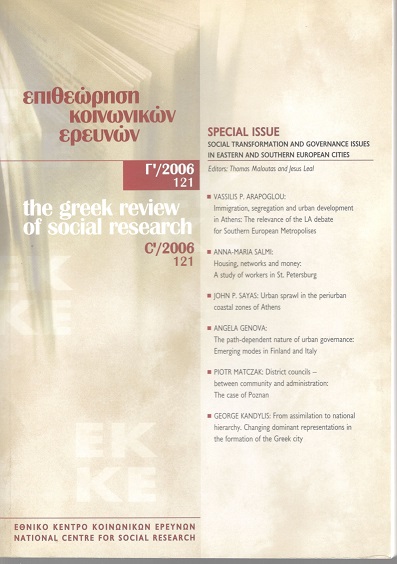The path-dependent nature of urban governance: Emerging modes in Finland and Italy
Περίληψη
The socio-economic changes and the territorial reorganisation they imply (new productive districts, new emerging regional economies, etc) together with the processes of political and administrative reform bring about a deeper process of rescaling strongly affecting European urban societies since the end of the 70s. Among the main consequences we find the processes of welfare state reform towards new forms of local welfare arrangements characterised by the rhetoric of activation policies. Cities are now increasingly the main actor in the design of new welfare policies within the broader context of the reconfiguration of urban governance. The aim of the paper is to investigate the modes of urban governance emerging from the reform process common to most EU countries. My hypothesis is that there is a relationship between urban governance modes and welfare regimes. The analysis of urban welfare modes of governance in two EU capitals, Helsinki and Rome bring to light the role of local institutional milieus in shaping modes of governance. Although there are common challenges and a common response toward an increasing neoliberal role of activation policies, local institutional milieus have played a crucial role in defining a path-dependant process of reform. In social democratic welfare regimes a managerial mode of governance has emerged, stressing the central role of the State. In the familistic welfare regime, the consolidated role of third sector organizations and the non-structured and fragmented position of local public authorities in welfare policies has shaped a mode of clientelistic and corporatist governance.
Λεπτομέρειες άρθρου
- Πώς να δημιουργήσετε Αναφορές
-
Genova, A. (2016). The path-dependent nature of urban governance: Emerging modes in Finland and Italy. Επιθεώρηση Κοινωνικών Ερευνών, 121, 105–135. https://doi.org/10.12681/grsr.9570
- Ενότητα
- Άρθρα

Αυτή η εργασία είναι αδειοδοτημένη υπό το CC Αναφορά Δημιουργού – Μη Εμπορική Χρήση 4.0.
Οι συγγραφείς των άρθρων που δημοσιεύονται στην Επιθεώρηση Κοινωνικών Ερευνών διατηρούν τα δικαιώματα πνευματικής ιδιοκτησίας επί των άρθρων τους, δίνοντας στο περιοδικό το δικαίωμα της πρώτης δημοσίευσης. Άρθρα που δημοσιεύονται στην Επιθεώρηση Κοινωνικών Ερευνών διατίθενται με άδεια Creative Commons 4.0 και σύμφωνα με την άδεια μπορούν να χρησιμοποιούνται ελεύθερα, με αναφορά στο/στη συγγραφέα και στην πρώτη δημοσίευση για μη κερδοσκοπικούς σκοπούς.
Το Εθνικό Κέντρο Κοινωνικών Ερευνών διατηρεί το δικαίωμα να δημοσιεύει, να αναπαραγάγει, να παρουσιάζει στο κοινό, να διανέμει και χρησιμοποιεί άρθρα που δημοσιεύονται στην Επιθεώρηση Κοινωνικών Ερευνών σε οποιοδήποτε μέσο και μορφή είτε μεμονωμένα είτε ως μέρη συλλογικών έργων, για όλο τον χρόνο διάρκειας προστασίας της πνευματικής ιδιοκτησίας και για όλες τις χώρες του κόσμου. Αυτό περιλαμβάνει ενδεικτικά και όχι αποκλειστικά το δικαίωμα δημοσίευσης των άρθρων σε τεύχη της Επιθεώρησης Κοινωνικών Ερευνών, αναπαραγωγής και διανομής μεμονωμένων αντιγράφων των άρθρων, αναπαραγωγής ολόκληρων των άρθρων σε άλλη έκδοση του Εθνικού Κέντρου Κοινωνικών Ερευνών, καθώς και αναπαραγωγής και διανομής των άρθρων ή περίληψης αυτών με χρήση πληροφορικού συστήματος αποθετηρίου.



